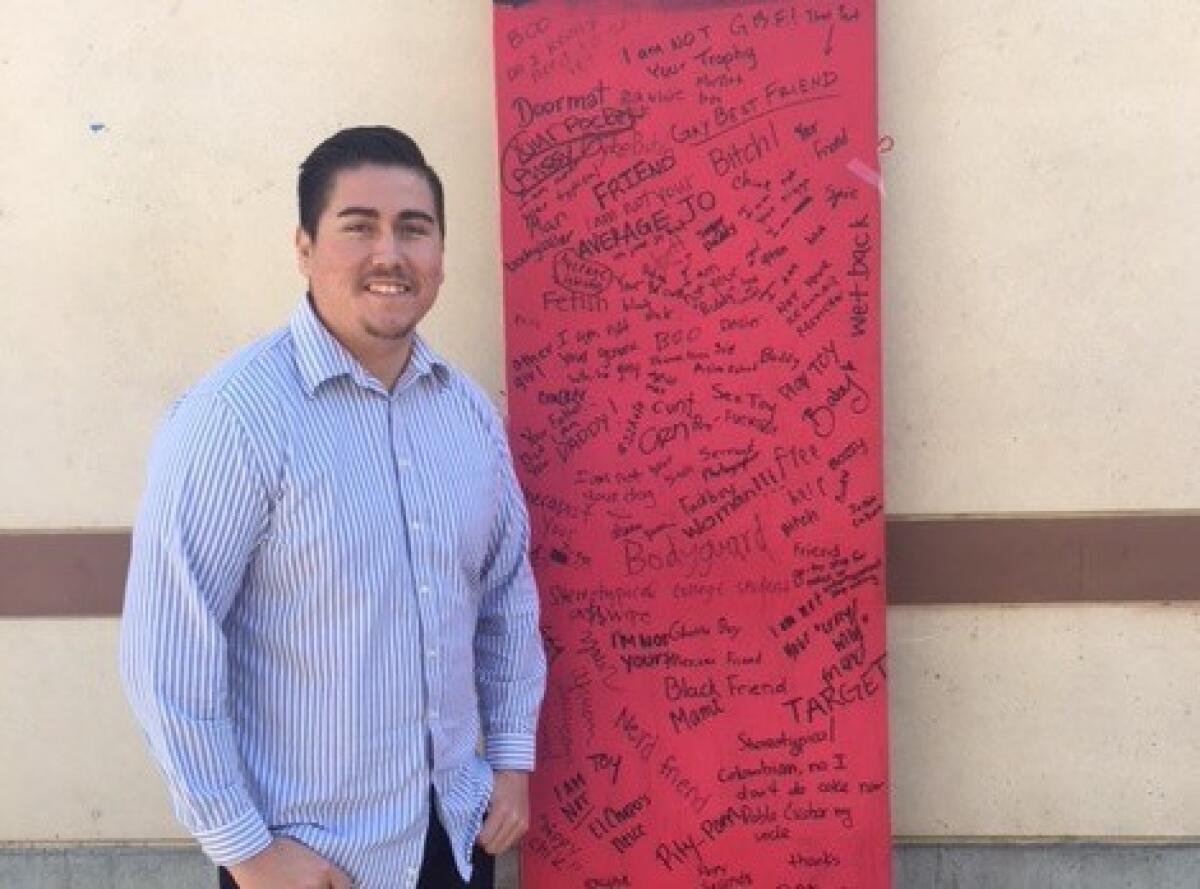Q&A: Campus conversation: University of Redlands’ Reggie Robles talks about Trump, ‘myths of masculinity’

- Share via
When Donald Trump won the presidential election last year, Reggie Robles felt like all his work had hit reset. Then came the drumbeat of sexual assault reports in Hollywood, politics, academia.
Robles is the associate director of campus diversity and inclusion at the University of Redlands. He also is the co-founder of a campus program called DUDES, or Dudes Understanding Diversity and Ending Stereotypes.
DUDES encourages young males to talk to each other about compassion, violence and the social pressures they feel to be masculine. It brings them together to consider with full frankness what it really means to be a man.
No question is too candid for Robles, who plays pickup basketball, likes the same music as his students and even lived for a time in the dorms. Through workshops, speaker series and social activities, his students point out — and question — what men do and don’t do. Why is showing emotion stigmatized? What’s wrong with asking for help?
Helping young men unlearn “toxic myths of masculinity,” Robles says, reshapes the sort of thinking that can lead to sexual assault and violence. It prepares them to go out into the world and break down gender walls that still exist in the workplace and society.
The participation on campus is growing, and next semester, the program is inviting students from other universities to join the conversation. As Robles and his students wrap up their annual DUDES week, he took a moment to reflect on recent events.
How have DUDES conversations changed since Trump took office?
I think what Trump did was put all of these messed up things that we as men do on a pedestal. Objectifying women. Saying horrible things about people in general. Utilizing power not to help others. It’s almost like everything that we had been working towards — finding your true self, being authentic with people, showing emotion and expressing yourself in a way that allows you to be free and happy — had just gone out the window after the election.
So right after the election, we had a talk about masculinity. For example, if we hear the term “locker room talk,” what does that mean? Because if it is objectifying women, if it is saying hateful slurs toward any individual, do you really want to be associated with that type of conversation?
Students are starting to question: “Is what’s being said only OK because no one puts a stop to what is being said?” It’s been interesting to see that, the students who are coming to these talks, who are coming to class, are starting to challenge perspectives that wouldn’t have been challenged before.


Do you talk about Harvey Weinstein and other recent reports of sexual assault in Hollywood, politics and elsewhere?
I don’t mention them [by name]. I think it’s a problem that men have in society overall — and if we only talk about certain people, does that then mean that there aren’t other people who may be also at fault for this kind of behavior? The issue is bigger than any one person.
We continue to find ways to talk about aggressive behavior, objectification of women, inciting violence with language. We talk about rejection.
In the last month, we’ve been able to talk about these things in a deeper way. It’s a huge problem in our society partly because there’s this notion that we don’t get taught that it’s OK when we lose. When people say no to us, we find other ways to get what we want — and that’s OK. It’s great to take that and apply it to goals, visions, things that you want to accomplish in your career.
But what’s not OK is in the ways that when we grow older, we then take this and apply it to people. It’s very different when you want, need and take a person.
How do you get students to open up?
It's a lot about reflection — self-reflection on your own experiences. I grew up in a very masculine, hyper-masculine environment.
It’s about having difficult conversations, judgment free. We’ve had conversations that have gotten heated. Why do men cheat? Why is it OK for only women to show emotion?
I went this weekend to see that movie “Coco.” And there was this big huge guy sitting a couple seats next to me, and he was just bawling. And when he walked out, he walked out covering his face. Why is that wrong?
I think about these things, how they really play in society, and I bring them back to an educational setting. And students are very, very, very interested because they’re real-life situations.
What are some of the masculine perceptions that your students share?
There are so many. For example, everybody always picks the muscle car. Everybody always picks the Mustang or the Camaro, even the Range Rover, but never the Fiat or the Volkswagen or the Prius when you’re picking your dream car.
Why is that? Because you want to be seen as someone strong and powerful? Is that compensating for something else? That was mind-blowing for some students. We were talking about power and privilege in a conversation about hip hop and masculinity, and I brought up this example and they were like: “Huh? Whoa! That’s so true.”
What we do is, we ask questions. And it’s not to say that we’re going to change anyone’s mind. It’s to give perspective, see multiple perspectives, and then come up with values that make sense to your own person.
This interview was edited for length and clarity.
Follow @RosannaXia for more higher education news.
Sign up for Essential California
The most important California stories and recommendations in your inbox every morning.
You may occasionally receive promotional content from the Los Angeles Times.








